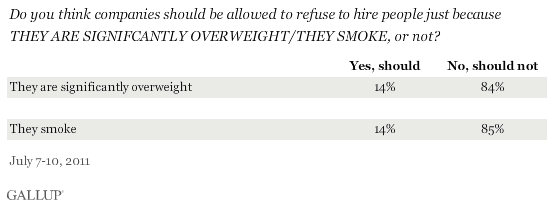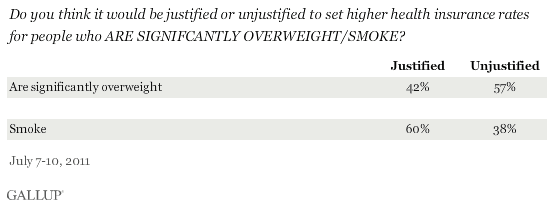WASHINGTON, D.C. -- More than 8 in 10 Americans think it is not right for
companies to refuse to hire people just because they are significantly
overweight or smoke. Fourteen percent say the practice should be allowed for
each.

The views Americans express in the July 7-10 poll are essentially unchanged
from prior Gallup readings on the same questions since 2005. In 2003, Gallup
also found most Americans saying that if they were in a position to hire
someone, it would make no difference to them if that person were
overweight (79%) or smoked (74%).
While the new poll found that for the first time a majority
of Americans want smoking to be banned in all public places, far fewer
people support making it completely illegal in the United States. Taking all
these findings about smoking together shows that Americans -- while generally in
favor of not having others smoke around them -- appear mostly supportive of an
individual's freedom of choice to use tobacco.
More Support for Higher Health Insurance Rates for Smokers, the Very
Overweight
In contrast to the lack of support for hiring discrimination against smokers,
the majority of Americans (60%) say it is justified to set higher health
insurance rates for smokers. Thirty-eight percent say it is unjustified.
Similarly, Americans are more supportive of setting higher health insurance
rates for people who are significantly overweight than they are of allowing
companies not to hire such people (42% vs. 14%). However, the majority -- 57% --
say it is unjustified to set higher rates just because someone is very
overweight.

Many more Americans are overweight
than smoke,
which partly explains their greater likelihood to support higher health
insurance rates for smokers than to support higher rates for people who are very
overweight. That is, Americans' views on the matter partly reflect their own
personal situations.
Additionally, it may be that the direct connection between smoking and health
costs is better established in people's minds than the link between being
overweight and health costs. And charging higher life insurance rates for
smokers is already a well-established practice, which may help make it more
acceptable to people in the health insurance situation.
Interestingly, even 35% of smokers in the July 7-10 poll say it is justified
to set higher health insurance rates for people who smoke. Another 57% of former
smokers say the same.
Support Levels for Rate Hikes Reflect Socio-Economic Differences in
Smoking, Weight
The differences in various groups' views on whether it is justified to set
higher health insurance rates for people who smoke or are very overweight
generally mirror socio-economic differences in smoking and obesity rates.
Higher-income and highly educated Americans -- who are less
likely to be overweight and to
smoke -- are more likely than low-income and less-educated people to say it
is justified to set higher health insurance rates for smokers and for those who
are significantly overweight.
Women Are More Compassionate Toward Very Overweight
People
Women are significantly less likely than men to say it is justified to set
higher health insurance rates for very overweight people and to think it is OK
for companies to refuse to hire such individuals.

This is a particularly striking point, as it is men who are more likely than
women to be very
overweight or obese.
Bottom Line
As companies across the United States face the challenge of maintaining a
healthy, productive workforce and grapple with rising health insurance costs,
corporate hiring policies and insurance rates for smokers and very overweight
people are becoming prominent issues.
Americans are clear on one point, though -- they do not support allowing
companies to discriminate against smokers or significantly overweight people
when making hiring decisions. Whether a national consensus or corporate policy,
however, has any impact on a specific hiring situation is a separate issue. The
data confirm that if a man is making the hiring decision, he may be more likely
than a woman to discriminate against a very overweight person -- similar to what
Gallup has found in the past.
Americans are more divided when it comes to how to set health insurance rates
for smokers and the very overweight. While a majority say it is justified to set
higher rates for smokers, a similar majority says it is unjustified to
do the same for significantly overweight people.